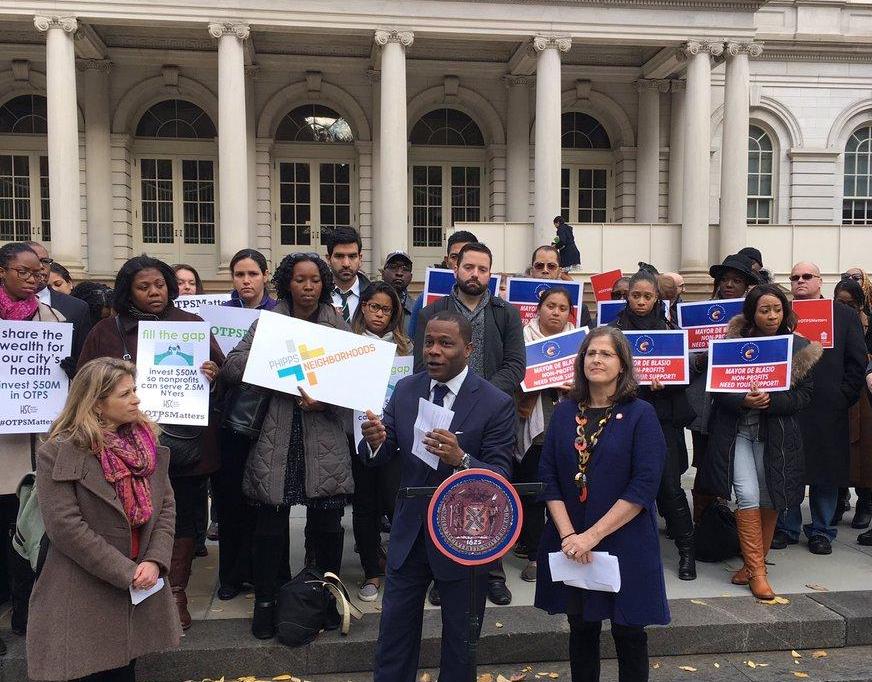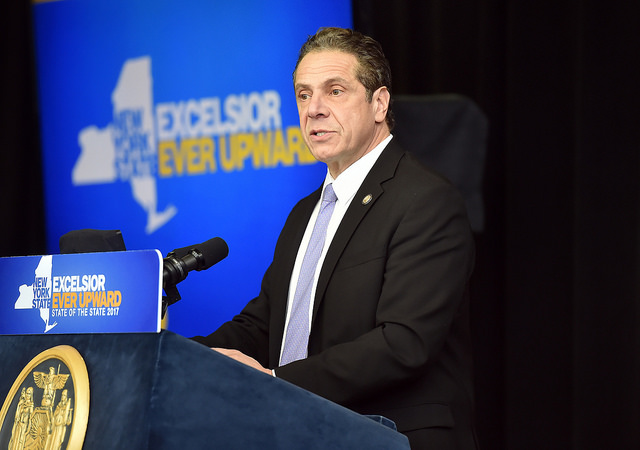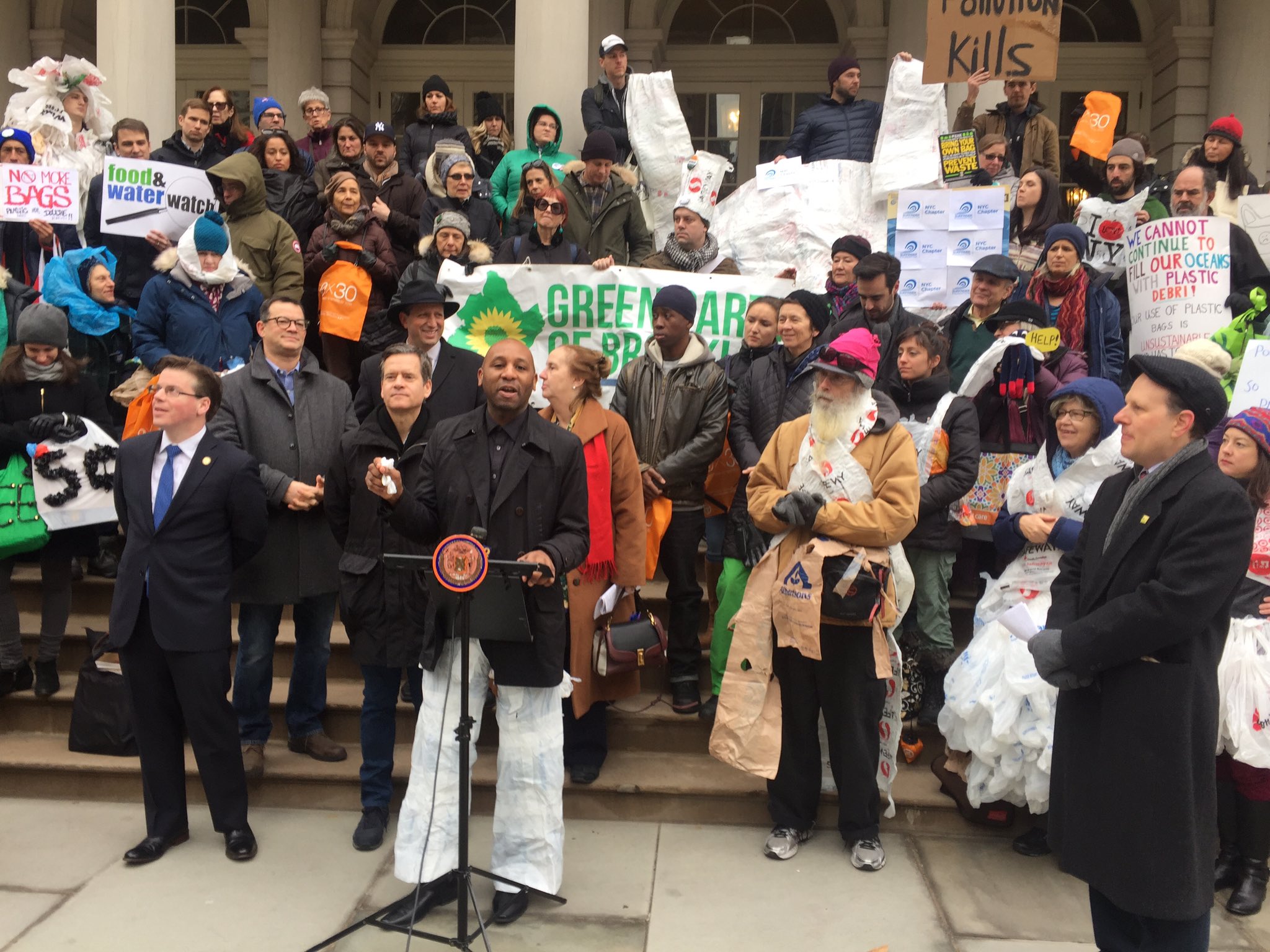The Time Is Now to Increase City Human Services Contracts

Urban Pathways members rally outside City Hall (photo via Urban Pathways)
In May 2015, my fellow Urban Pathways Board Member Gary Belsky rightfully recognized Mayor Bill de Blasio’s fiscal year 2016 budget investment in the human services nonprofit workforce. The investment -- a 2.5 percent cost of living adjustment and an $11.50-per-hour wage floor, coupled with a subsequent City-funded $15 minimum wage -- rewarded a long neglected workforce instrumental to moving vulnerable New Yorkers and the City forward.
However, as we approach the fiscal year 2018 budget, the mayor has more to do. It is now time for him to follow these laudable staff investments with a 12 percent increase in the city’s human services contracts themselves. Contract increases will act in concert with the enacted workforce investments. They will ensure we have human services organizations to employ the workers now deservedly earning a higher wage. (In 2013, nearly one in five city human services providers operated in the red, an indicator of potential closure.)
Human services nonprofits serve the most vulnerable in our city, about 2.5 million New Yorkers each year. They provide early childhood education and after-school programs, run food pantries, provide mental health services, house persons experiencing homelessness, and care for the elderly, among many other community services. Urban Pathways, for example, assists homeless adults in the New York City metropolitan area through a continuum of services and supportive housing.
Increases will enable us to provide ample training and affordable benefits to our staff. Years of flat funding from the city amid the rising costs of health care have complicated our ability to remain fiscally sound. This year, Urban Pathways endured another double-digit increase in our health care costs for our over 300 employees. Flat funding forces us to split these double-digit increases with our employees, resulting in increased co-pays and obligating us to modify our health insurance carrier.
City contract increases will also reverse the tide of consistently underfunded contracts. In the past decade, the city has granted only one increase to its human services contracts. This has yielded barebones human services programs that should do more than merely subsist. Those whom we serve deserve that.
A consistent challenge Urban Pathways faces in operating our facilities for alternatives to shelter for homeless adults -- the Olivieri Drop-In Center, Hegeman Safe Haven and Travelers Safe Haven -- is inadequate city investment in the form of an underfunded Other Than Personal Services (OTPS) line. OTPS constitutes a significant line in the budgets of our Drop-In Center and Safe Havens. We draw on it to feed the 500 clients we annually serve at these programs so they have access to healthy food amid their paltry incomes. We use it to ensure our staff receives benefits and development to counter high turnover in our sector. We also rely on it to upgrade technology and make capital repairs so infrastructure remains sound. Our Safe Havens, like any other buildings, break and require maintenance.
As a board member, I with countless others, invest time, money and personal equity in human services organizations across the city. We proudly do so because we recognize the value of these organizations. They are vital to the individuals receiving the services, our communities and the city overall. We also take our fiduciary duty seriously, and recognize that the challenges are growing and threaten the sustainability of these organizations.
The time is now for the mayor to complete his work and enact a budget that includes a 12 percent increase in the city’s human services contracts. Let’s ensure human services organizations and their workforce can develop and run programs to their fullest capabilities.
***
Kelley Gott has been an Executive Board Member of Urban Pathways since 2015.
***
Have an op-ed idea or submission for Gotham Gazette? Email This email address is being protected from spambots. You need JavaScript enabled to view it.
New York Reasserts Its Historic Leadership as a Haven for Immigrants

Governor Andrew Cuomo (photo: Kevin Coughlin/The Governor's office)
New York Governor Andrew Cuomo has joined the chorus of criticism against President Trump’s ban on refugees and other immigrants from seven predominantly Muslim nations. “I never thought I’d see the day when refugees who have fled war-torn countries in search of a better life would be turned away at our doorstep," the governor said in a statement following the president’s executive order. "We are a nation of bridges, not walls, and a great many of us still believe in the words 'give me your tired, your poor, your huddled masses...' This is not who we are, and not who we should be.”
Mario Cuomo strikes a resounding chord
Andrew Cuomo's support for immigration and diversity echoes the sentiments of his father, former Governor Mario Cuomo, who served from 1983 to 1995. The elder Cuomo was the first Italian American elected as governor of New York State. He had no tolerance for prejudice and worked tirelessly for human equality and dignity. A champion of recognizing merit regardless of sex or race, he appointed the first Black, the first Latino, and the first two women judges to the state's Court of Appeals.
In talking about immigration issues, Mario Cuomo often recalled the story of his parents, Andrea and Immaculata Cuomo. Penniless and unable to speak English, they had come to the United States from the Italian province of Salerno, south of Naples -- Andrea in 1926 and his wife a year later in 1927. After spending three years in Jersey City, they moved to the Queens neighborhood of South Jamaica, where they opened a grocery store and raised their family.
By that time, there were thousands of Italian Americans in New York. But across the nation, there was lots of prejudice against Italians for their religion (mostly Catholic), speech (most learned English, but often it was not perfect) and culture (they retained some old country ways but assimilated into their new land and were proud to be Americans). Congress enacted laws in 1921 and 1924 to cap total annual immigration and impose numerical quotas based on immigrant nationality that favored northern and western European countries. The laws were directed against Italians and others from southern Europe. “The old belief in America as a promised land for all who yearn for freedom had lost its operative significance," with the passage of these laws, wrote historian John Higham in his book “Strangers in the Land: Patterns of American Nativism, 1860-1925.” It had been replaced by a "new equation between national loyalty and a large measure of political and social conformity." By the time Mario Cuomo's parents arrived, a few years after the restrictive legislation, the flow of southern and eastern European immigrants had been greatly reduced.
National immigration policy continued to change and became more open in later years. But Mario Cuomo, born in 1932, remembered the sort of prejudice his parents faced and fought it his entire career. For him, it was a personal matter as well as a matter of public policy.
In a 1992 speech at New York University, Cuomo decried "nativist sloganeering and parochial fear-mongering that's been aimed at every group of new immigrants throughout our history." He recalled his parents' lives. "I thank God the country didn't say to them 'we can't afford you right now; you might take someone else's jobs, or cost us too much,'”, he said. “I'm glad they didn't ask my father if he could speak English, because he couldn't. I'm glad they didn't ask my mother if she could count, because she couldn't...I'm glad they didn't ask my father what special skills he brought to this great and dynamic nation because there was no special expertise to the way he handled a shovel when he dug trenches for a sewer pipe. I'm glad they let him in anyway."
Cuomo worked to rally the Democratic party for the cause of immigrants. "We speak for the minorities who have not yet entered the mainstream," he said in his address to the 1984 Democratic convention. "We speak for ethnics who want to add their culture to the magnificent mosaic that is America."
Andrew Cuomo continues a New York tradition
Speaking at the 2016 Democratic National Convention last July, Andrew Cuomo sounded a similar note. "The Trump campaign is marketing a great distraction, using people’s fear and anxiety to drive his ratings," he told the delegates. "Their message comes down to this: be afraid of people who are different — be afraid of different religions and different colors and different languages. Stop immigration and they believe the nation will automatically rise. It’s not right, it’s divisive, it’s delusional, and we must expose the truth to the people of this nation. Unless Republicans are all Native Americans, then they are immigrants too."
In a speech this past November, Andrew Cuomo asserted that he and New York will fight against the spread of anti-immigrant fear. Like his father, he put it in personal terms. "If there is a move to deport immigrants then I say start with me,” he said. “I am a son of immigrants. Son of Mario Cuomo, who is the son of Andrea Cuomo, a poor, Italian immigrant who came to this country without a job, without money, or resources and he was here only for the promise of America."
Cuomo intends to make good on his promise to protect immigrant rights. He has ordered his counsel's office to explore legal options to help anyone detained at New York airports to ensure their rights are protected. Promising more action, on January 29 he said, “As New Yorkers who live in the shadow of the Statue of Liberty, we welcome new immigrants as a source of energy and celebrate them as a source of revitalization for our state. We will ensure New York remains a beacon of hope and opportunity and will work to protect the rights of those seeking refuge in our state."
New York -- Land of promise
The fight over refugees and immigrants is likely to be a spirited one. The Trump administration promises to strengthen restrictions and ramp up stringent vetting of foreigners who want to enter the country. New York State seems likely to insist on continuing its historical tradition of welcoming newcomers. New York has led before and will again this time. It is a natural role for our state, particularly since New York City is where more immigrants have entered the nation over the years than at any other place.
Immigration policies varied over the years, but many of the immigrants have had one thing in common - aspirations for a better life. "More than anything else, the immigrants come with dreams -- dreams that hunger might become a thing of the past, dreams that restrictions and discrimination might be replaced by rights, and dreams that poverty might be traded for security and opportunity, if not for oneself, then at least for one's children or grandchildren," writes Andrew Anbinder in his new book “City of Dreams: The 400-Year Epic History of Immigrant New York.” He continues, "These dreams characterized the New York immigrant story from the arrival of the first Dutch settlers through the heyday of Five Points, the Lower East Side, and Little Italy. Those same dreams dominate the lives of New York's newest immigrants, whether they are Chinese or Guyanese, Jamaican or Dominican, Mexican or Ghanaian. The story of immigrant New York is truly a story of dreams."
***
Dr. Bruce W. Dearstyne's latest book is The Spirit of New York: Defining Events in the Empire State's History, published in 2015 by SUNY Press.
***
Have an op-ed idea or submission for Gotham Gazette? Email This email address is being protected from spambots. You need JavaScript enabled to view it.
State Legislators from New York City Should Not Be Bagging the Bag Fee

Elected officials and advocates rally outside City Hall (photo: @bradlander)
New York City is trying to do something about plastic bags, but my state Assemblymember is attempting to undermine the city’s ability to do so. He, along with many of his NYC-based colleagues, are acting against their own constituents’ interests. This is a normal New York State versus City story, but in a moment where the stakes of politics are high because the federal government’s threats are real, this battle between city and state feels more offensive and disheartening than ever.
The story today is that New York City passed a law last year that requires most shops to charge a five cent fee for each carryout bag a person takes when shopping. However, in January, the state Senate passed a bill to say, “Sorry New York City, we don’t like that bill so we’re going to kill it.” The state Assembly, rather than deny the Senate outright, chose to punt and delay the implementation of the city’s law for one year. As of publication, Albany’s compromise would require a new City Council to vote on the carryout bag fee a second time, after different Council members are elected for a 2018 term.
The state Legislature's actions are a structural problem, a political problem, and a problem of spirit in these times.
Structural problem: The state constitution has a problem, because it does not stop the state Legislature from having so much influence over the way the city governs itself. Even though the state constitution provides us the right to make our own laws through the so-called home rule provision, the Legislature is very good at getting around it. Lawmakers often use the language, “In cities with a population of more than one million...” as the preamble to a law intended to impact one city. There is only one city in this state that falls into the category of more than a million people. Although this current block of the bag bill might not be constitutional, the state Legislature knows they have a lot of precedent telling them that they might be able to do this. We could change the state constitution to protect the city’s home rule powers, but not with the Legislature guarding this power so jealously.
Political problem: The state Senate is very confusing. There are more Democrats than Republicans, by one senator. That senator, a Democrat named Simcha Felder, spends his time with the Republicans and does not work with the Democrats. He is proud to be a Democrat in name only. There are also a group of eight Democrats called the Independent Democratic Caucus (IDC) who work with the Republicans, giving the Republicans an effective supermajority. They appear to hate this bag bill, and so they easily gave the Republicans in the Senate the power to undermine New York City’s desire to take another step toward a better environment. Most of the IDC is made of Senators who represent the city.
Spirit of resistance problem: We need to take every stand we can to resist the current White House. This means that our state should be standing proud and together to show the federal government that we care about better environmental law and policy. Seeing Assembly members from the city fighting with the City Council by effectively wagging their legislative finger is not the message we should send right now. I want to see my state legislators prioritizing their energy by improving our healthcare laws here, our worker protections here, and our environmental laws here. All of these policies are under threat or attack from the federal government.
This is why I can’t understand why my Brooklyn Assemblymember, Walter T. Mosley has not publicly stated his opposition to this bill. The state Legislature should support New York City and work together right now for the good of us all. Every environmental advocacy group in the city supports this bill. And most of the time, my Assemblymember supports the progressive legislation that his constituents expect of him. Every New York City-based state Legislator should be with their constituents on this right now and show their spirit of resistance in all forms.
***
Richard Semegram is a tenant lawyer, his Twitter handle is @richagram
***
Have an op-ed idea or submission for Gotham Gazette? Email This email address is being protected from spambots. You need JavaScript enabled to view it.




